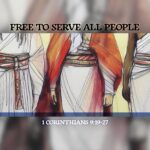[TRANSCRIPT]
Some believe that 1 Corinthians 9 seems like an interruption to Paul’s flow of thought. Why would he suddenly change the subject to himself? What does a detour into his rights as an Apostle have to do with the broader discussion he initiated in chapter eight? Although he shifted the focus from the church to himself, the subject matter remains related. He’s still teaching about the rights we hold as Christians. He used his own real-life example to make his point. He achieved this by presenting a biblical case for his rights and then a biblical case for why he chose not to exercise those rights. What right does he use as an example? He emphasized the right of a minister to earn a living from his ministry.
“Am I not free? Am I not an apostle? Have I not seen Jesus our Lord? Are not you my workmanship in the Lord?” – 1 Corinthians 9:1
Paul began with a series of rhetorical questions that the Corinthians would have answered unanimously with a “yes.” There is some discussion about what Paul meant by “free,” but in the broadest sense, this freedom is directly connected to Christ’s own teaching that when the Son makes you free, you are free indeed (John 8:36). It is a uniquely Christian freedom shared by every believer. However, the question he raised regarding his apostleship had a specific purpose. False apostles had begun causing disturbances in the church. In 2 Corinthians, Paul mockingly referred to them as “super-apostles” (2 Corinthians 11:5). Though unnamed, these false apostles influence the broader discussion of this chapter.
What are the rights of an apostle? Paul contended that apostles have the right to make a living from their ministry and to have a wife who travels with them. However, it seems that some members of the Corinthian church questioned whether Barnabas and Paul were free to do these things. They wondered whether ministers of the Gospel should have to work a regular job like the people they were shepherding. These thoughts may have stemmed from some of the divisions within their church. However, it’s also likely that the false apostles had fleeced the flock, creating a negative sentiment toward those who would earn their living from their ministry.
As a pastor who makes his living from his ministry, I’m keenly aware of the charlatans who abuse the flock. There used to be an Instagram account called Preachers with Sneakers that showcased high-profile pastors who were wearing super expensive sneakers… $500+ pairs of sneakers while they preached. I don’t know if all of those preachers with sneakers were actually fleecing their flocks, but the sentiment created simply from what they were wearing is telling. I know that some of these guys defend themselves by saying the sneakers were gifts. Assuming that’s true, the enemy still takes advantage to create division. Satan will take a legitimate right, and using whatever foothold he can gain, attack that right and try to steal, kill, and destroy the Lord’s servants.
Nonetheless, in verse five, Paul pointed out that Peter (Cephas) and several of the other Apostles had wives and made a living from their ministries. He built his argument starting with the Law.
“For it is written in the law of Moses, ‘You shall not muzzle an ox while it treads out the grain.’ Is it oxen God is concerned about?” 1 Corinthians 9:9 (NKJV)
Then, in verse fourteen, Paul argues that Jesus taught this as well. He did not include a quotation, leading us to assume that the Corinthian readers would have been familiar with the command he is referencing. It appears he was alluding to Matthew 10:10 when Jesus sent out his disciples to preach, instructing them to take no money, for a laborer deserves his food. In other words, the individuals who welcomed the disciples and benefited from their ministry would provide for them.
Paul wasn’t constructing this argument for a paid clergy for its own sake. He was comparing a legitimate right that he and Barnabas could exercise to the rights and freedoms that the mature believers were insisting upon from chapter eight.
“But I have made no use of any of these rights, nor am I writing these things to secure any such provision. For I would rather die than have anyone deprive me of my ground for boasting.” – 1 Corinthians 9:15
Have you ever said, “I would rather die than…” fill in the blank? We all have at one point or another. For Paul, he would rather die than be paid for his ministry. But didn’t he just build the Biblical case in favor of it? Yes. Paul called his free preaching the grounds for his boasting. Perhaps the false apostles had something to do with that. It’s possible that they collected large sums and promised miracles if you gave sacrificially.
Though that’s a bit of speculation, it fits. It happens today as well. Rather than suffer guilt by association, Paul distanced himself from such practices. He preached for free, and when there were miracles, they were free too. This was a personal conviction for Paul. Wolves soon attacked many of the churches he planted after his departure. He warned the Ephesian elders that this would happen (Acts 20:29).
The question becomes this: When should a minister do as Paul did? This is a matter of contextualization. Ministers do not sin when they make their living from their ministry. However, Paul demonstrated that there are times when it is better to make a living in another way while ministering free of charge. This is his personal example of how not to destroy a weaker brother’s conscience. It cost him personally, and at times, it likely created problems for him, but if it meant preserving the reputation of the Gospel, so be it. To prevent any offenses, he gladly laid aside his biblical right to a wage from the churches he served.
Full disclosure, I have always had a plan in my back pocket for a day when it would be better for me to make my living a different way as I continue in ministry. The economy could change and adversely affect giving in churches everywhere. I don’t live extravagantly, but even with a modest life, the margins aren’t fat. Or maybe something else. Politics could shift and make life difficult for churches. The plan in my back pocket isn’t a lack of trust in the Lord, it’s actually more faith in Him. If I worked outside of the church for a living, my calling remains. I’m still called to serve the Lord with the gifts He’s given me. I would be working hard at two things instead of just one… more faith, not less.
“For if I preach the gospel, that gives me no ground for boasting. For necessity is laid upon me. Woe to me if I do not preach the gospel!” 1 Corinthians 9:16
In verse sixteen, Paul’s wording is strong. He understood that the calling upon his life was to preach the Gospel. He described it as a necessity laid upon him. If he somehow disqualified himself and could no longer preach effectively, “Woe to me.” When Jesus pronounced woes over the Pharisees or towns that rejected Him, it was a declaration of judgment. Here, Paul seems to imply that if he didn’t fulfill the ministry to which he was called, he would face judgment from the Lord. In essence, preaching the Gospel was as fundamental to his life as breathing, which is why it was never a matter for him to refrain from charging. He would preach regardless, so it might as well be at no cost.
It’s interesting how deeply Paul’s calling penetrated his life. His life conformed to the calling, not the other way around. Whether he received a living from it wasn’t the point. The point is that Jesus changed him so fundamentally that for him to live any other way would only serve to pile up woes for him.
The Lord doesn’t call everyone to preach. But he calls each of us to something, and He provides us with the gifts necessary to do His calling. What have you done with your calling? What necessity from the Lord has been laid upon you? Ephesians 2:10 tells us that the Lord has prepared in advance good works for us to walk in. Are you walking in them? Secondly, do you know what the Lord called you to do, but you’re not doing it? Paul believed it would be woeful for him to shirk or disqualify himself from the responsibility of preaching the Gospel. Are you laying up woe for yourself as you walk in willing disobedience?
Don’t misunderstand. This isn’t a judgment over your eternal salvation. It’s a judgment of reward. Paul’s ground for boasting – his reward – was intimately tied to fulfilling his ministry in a way that presented no obstacles for the Gospel (9:18). Whatever it is that the Lord has called you to do, you’ll be held accountable for it. Whether you finished well, disqualified yourself, ran on cruise control, or caved under pressure and ran away, accountability awaits you.







